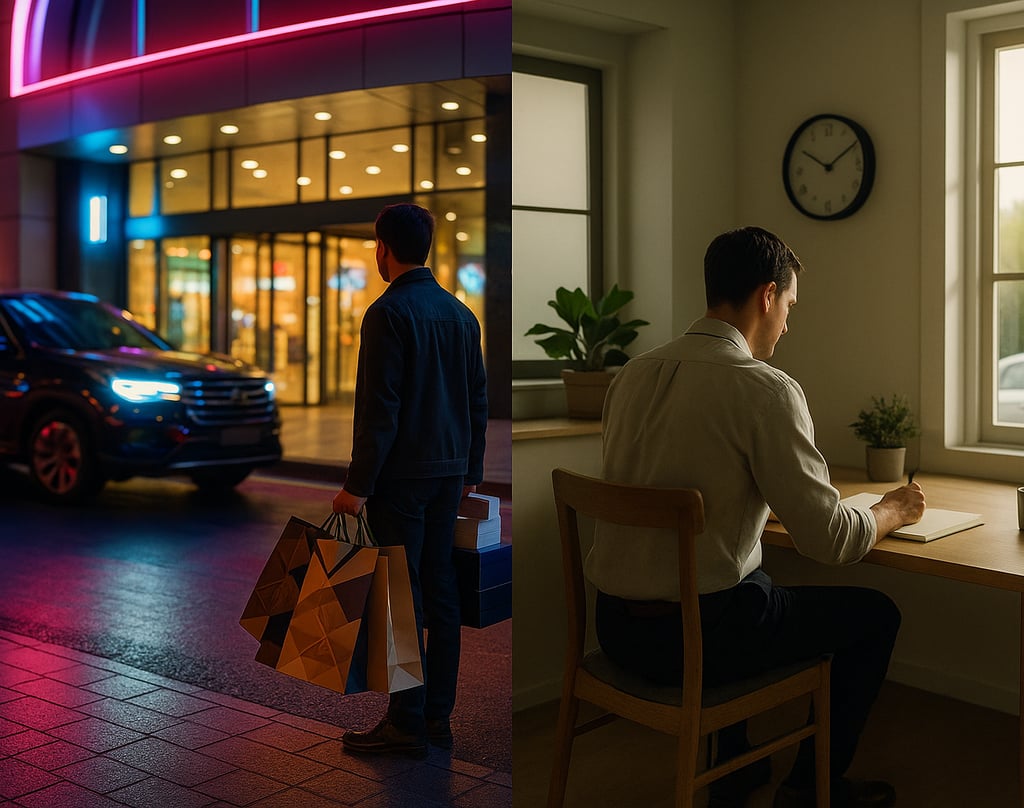Quiet Money, Loud Purchases: Why the Rich Ignore Your Status Symbols
We’ve been signaling status since we painted bisons on cave walls. Peacocks do it with feathers; primates with grooming. Modern humans prefer stitched logos, ultrawide screens, and a vacation slotted neatly between hashtags. The ritual hasn’t changed—just the costumes. But here’s the uncomfortable bit: the things the middle class most loves to parade as proof of success are, in wealth terms, bad instruments. They don’t store value. They don’t buy freedom. They mostly buy applause from strangers and invoices from vendors.
FINANCIAL DISCIPLINE
9/4/20254 min read


The wealthy—people with genuine options—play a different game. Their core asset isn’t a handbag or a car; it’s optionality: the ability to say no, to walk away, to choose time over theater. And when you’re optimizing for options, conspicuous consumption looks like a tax on insecurity. The genuinely wealthy tend to optimize for quality, privacy, and total cost of ownership—not applause.
Logos vs. longevity.
The logo-heavy wardrobe is a billboard you pay to wear. Billboards serve the advertiser. Wealthy buyers lean toward “stealth wealth”: quietly made clothes whose value hides in stitching and fabric rather than a five-inch emblem. It’s not romantic; it’s arithmetic. Trend pieces depreciate on contact with tomorrow. Tailoring and durable materials amortize over years. If you buy to impress, you’ll keep buying. If you buy to last, you’ll keep your money.
Designer accessories and the $3,000 shrug.
For a middle-class budget, a luxury bag is a capital event. For the truly wealthy, it’s a rounding error. That mismatch is why the bag works as a status signal only among people for whom it hurts. The rich don’t need to outsource self-worth to a clasp. They also know most of these items are positional goods—their value is social, not intrinsic—and they depreciate anyway.
Gadgets are tools, not trophies.
Upgrading every cycle is a ritual that benefits marketing departments more than users. Wealthy operators buy for reliability, security, and workflow fit, then run devices to end-of-life. That’s not frugality; it’s TCO logic—total cost of ownership over time. A phone isn’t a self; it’s a screwdriver with LTE.
Vacations for privacy, not performance.
If your trip must be witnessed to be real, you’ve purchased theater. Quiet money optimizes for rest, learning, and relationships—and guards privacy for security reasons. The photos can wait; the point is to return with a better mind, not a better grid.
Cars that move you, not prove you.
Cars are degenerating assets with running costs attached. The middle class is often “car poor”—payments, insurance, maintenance in a loop. Wealthy buyers either let someone else eat the early depreciation or choose practical models and move on with their lives. A vehicle is a cost center, not a personality.
Zoom out and you see a pattern. Conspicuous consumption tries to buy status, which is external, relative, and perishable. Quiet wealth buys optionality, which is internal, absolute, and compounding. Status fades the moment a neighbor upgrades; optionality compounds every time you refuse a fragile commitment. Status asks: Do they think I’m winning? Optionality asks: Can I stop playing this game and still be fine?
The Pattern Behind All Five
It’s the same story: signal over substance. Middle-class status chasing tends to prioritize visibility and immediacy. Real wealth is quieter: it compounds. It avoids lock-in. It optimizes for optionality—the capacity to choose how you spend your attention, time, and energy next year without financial anxiety. That doesn’t photograph well, which is exactly why it works.
If You Actually Want to “Look” Rich—Don’t Try to Look Rich
Try this 20-minute audit:
Closet: Pull three logo-heavy pieces you rarely wear. Sell or donate. Reinvest in one high-durability essential (tailored trousers, unbranded knit, resolable shoes).
Tech: Delay your next upgrade by one cycle unless a security or workflow gap is costing you money now. Put the saved cash into an emergency buffer.
Travel: Plan one trip around recovery or learning, not content. Delete the “must-get shot” list. Add a reading list, a class, or a local guide.
Car: Run a true TCO (depreciation, insurance, fuel, maintenance, time). If the number stings, you’re paying for validation. Downshift or hold.
Accessories: Apply the museum test: would this be compelling without the logo? If not, it’s costume jewelry for your ego.
The Forward-Looking Play
Conspicuous consumption lost its edge. The new elites signal with time control (no frantic schedules), health (sleep, biomarkers, sane routines), digital hygiene (privacy > performativity), and capital allocation (boring assets that quietly pay you). None of that is loud. All of it is durable.
Pushback (Good—Be Skeptical)
“But I like nice things.” Same. Preference is fine; self-deception is expensive. Buy for utility and joy, not audience.
“Some luxury holds value.” Rarely—and if you need to ask which, you’re late to the game. Assume depreciation unless you’ve done real homework.
“It’s my money.” Exactly. Then spend it like an owner: on assets that compound freedom, not on props that demand more props.
You don’t need to be rich to operate like this. In fact, the order reverses: you often need to operate like this to become rich—in money, in time, or in peace. Opt out of the status auction. Invest in the boring compounding things: skills, health, buffers, and relationships. Let other people fight over visible trophies. You’ll quietly accumulate the only status that matters: the freedom to decide what today looks like, and the margin to change your mind tomorrow.
Bottom line: If your purchases need applause to feel justified, they’re liabilities in disguise. Build a life that reads as low-drama on camera and high-leverage off it. Quiet wealth doesn’t beg to be seen because it’s busy being useful. That’s the difference Burns is pointing at—and it’s a difference you can start compounding today.
Inspired by Steve Burns’ “5 Things Middle-Class People Think Are Status Symbols But The Rich Know Are Not” on New Trader U (Aug 27, 2025). The original piece lays out the five categories in plain terms




